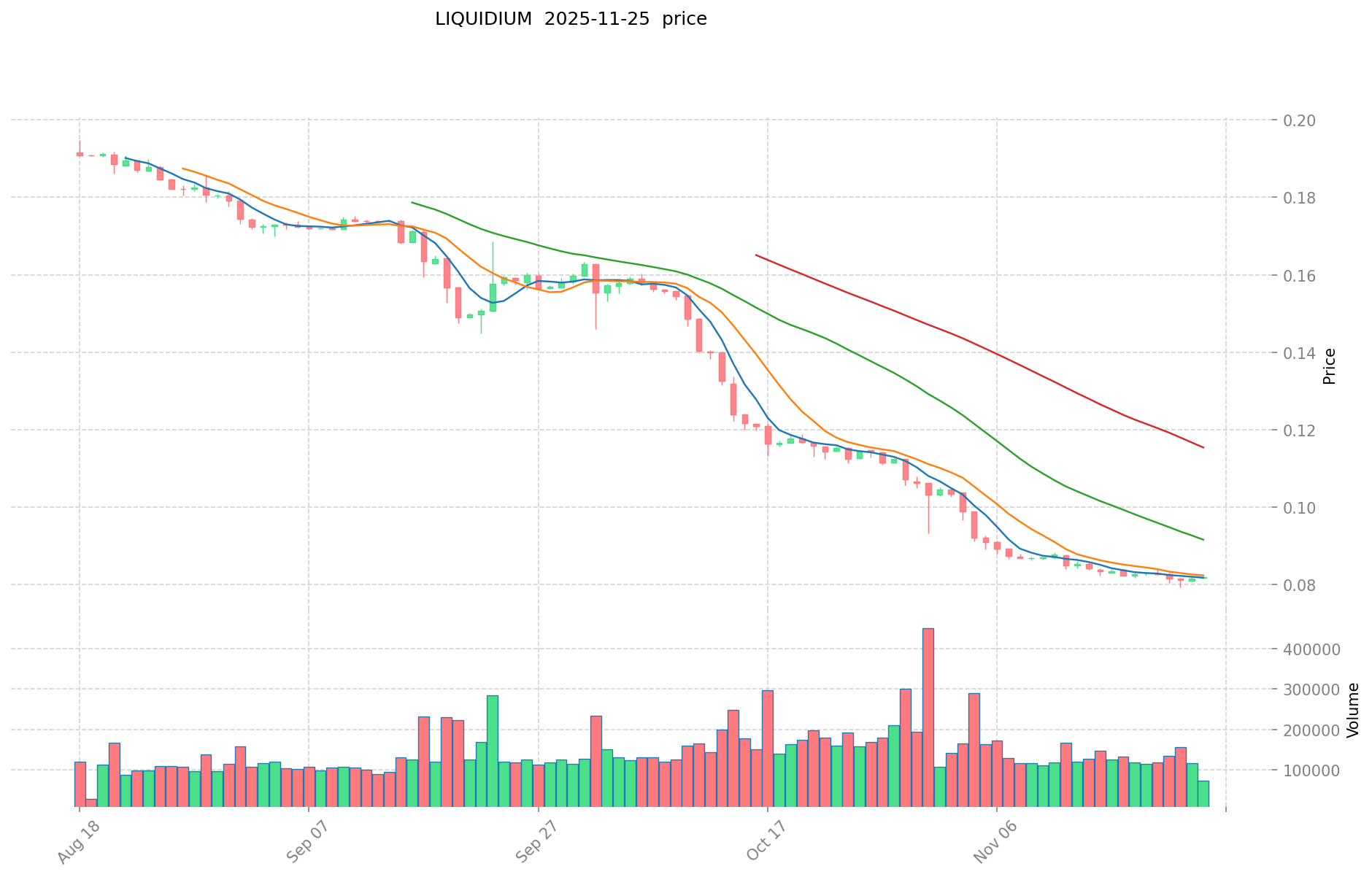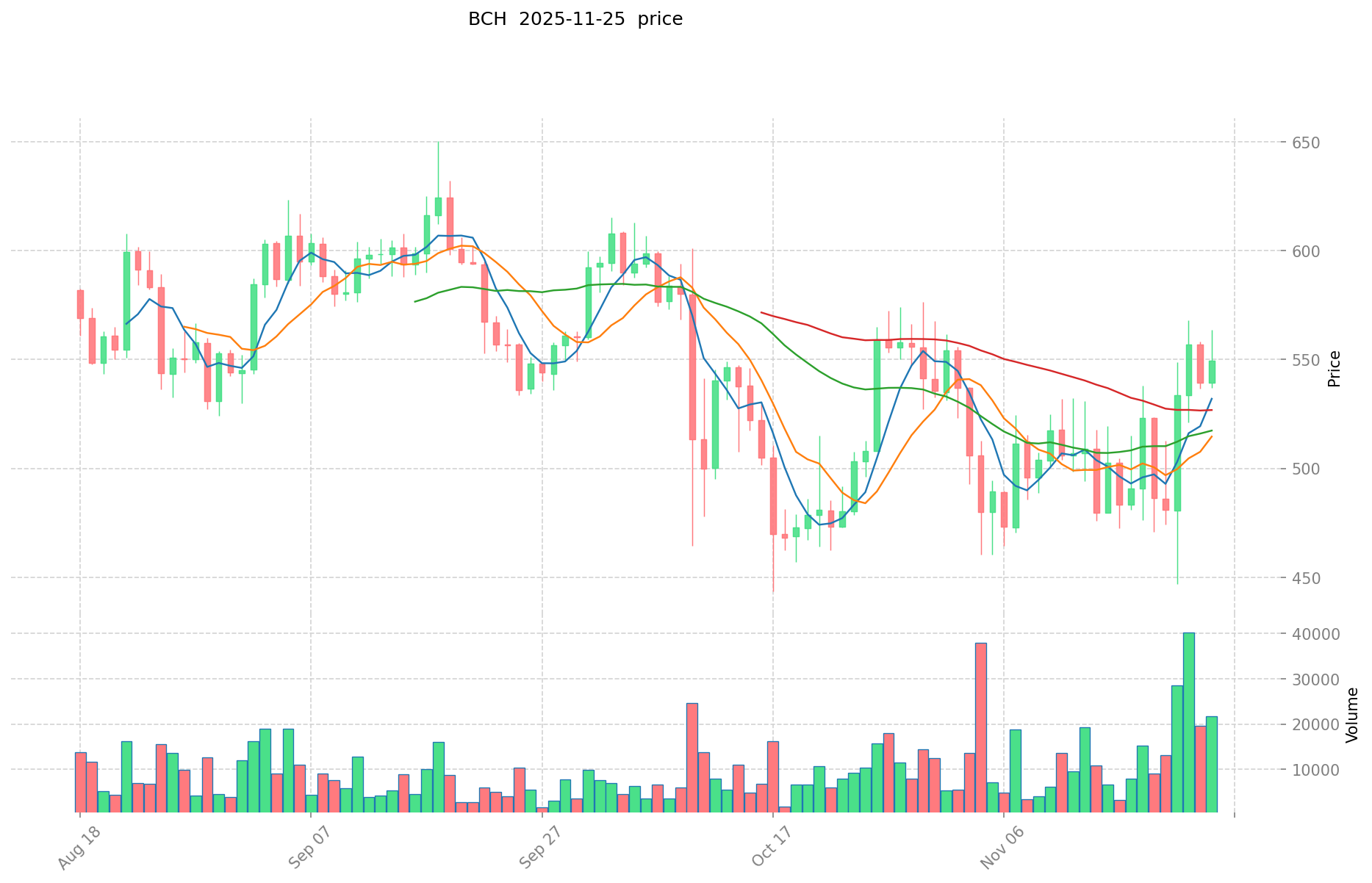LIQUIDIUM vs BCH: Comparing Two Innovative Blockchain Solutions for Digital Payments
Introduction: LIQUIDIUM vs BCH Investment Comparison
In the cryptocurrency market, the comparison between LIQUIDIUM vs BCH has always been a topic that investors cannot ignore. The two not only have significant differences in market cap ranking, application scenarios, and price performance, but also represent different positioning in the crypto asset space.
LIQUIDIUM (LIQUIDIUM): Since its launch, it has gained market recognition for its position as a leading non-custodial lending protocol on Bitcoin.
BCH (BCH): Since 2017, it has been hailed as a continuation of Satoshi's vision for global adoption, emerging as one of the cryptocurrencies with significant global trading volume and market capitalization.
This article will comprehensively analyze the investment value comparison between LIQUIDIUM vs BCH, focusing on historical price trends, supply mechanisms, institutional adoption, technological ecosystems, and future predictions, attempting to answer the question most concerning investors:
"Which is the better buy right now?"
I. Price History Comparison and Current Market Status
LIQUIDIUM (Coin A) and BCH (Coin B) Historical Price Trends
- 2024: LIQUIDIUM reached its all-time high of $1.6263 on July 22, 2024.
- 2017: BCH was created through a Bitcoin hard fork, with an initial price of $555.89.
- Comparative analysis: In recent market cycles, LIQUIDIUM dropped from its high of $1.6263 to a low of $0.05, while BCH fell from its all-time high of $3,785.82 in December 2017 to a low of $76.93 in December 2018.
Current Market Situation (2025-11-26)
- LIQUIDIUM current price: $0.08224
- BCH current price: $521.45
- 24-hour trading volume: LIQUIDIUM $2,762,617 vs BCH $7,534,890
- Market Sentiment Index (Fear & Greed Index): 20 (Extreme Fear)
Click to view real-time prices:
- View LIQUIDIUM current price Market Price
- View BCH current price Market Price


II. Core Factors Influencing LIQUIDIUM vs BCH Investment Value
Supply Mechanism Comparison (Tokenomics)
- Liquidium: Limited information available, likely operates within Bitcoin's Ordinals and Runes framework
- BCH: Traditional fixed supply with halving mechanism similar to Bitcoin
- 📌 Historical pattern: Supply mechanics drive price cycles differently for established networks (BCH) versus newer DeFi protocols (Liquidium)
Institutional Adoption and Market Applications
- Institutional holdings: Liquidium received early investment from Bitcoin Magazine and Bitcoin Frontier Fund
- Enterprise adoption: Liquidium provides Bitcoin inscription staking protocols, while BCH maintains traditional Bitcoin use cases
- Regulatory attitudes: Limited information available on specific regulatory positions for either asset
Technical Development and Ecosystem Building
- Liquidium technical upgrades: Layer 1 Ordinal lending protocol, enabling users to borrow against Ordinals and earn Bitcoin interest
- BCH technical development: Focuses on traditional Bitcoin functionality with emphasis on network security
- Ecosystem comparison: Liquidium is building specialized DeFi protocols for Bitcoin inscriptions, while BCH maintains a more traditional payment-focused ecosystem
Macroeconomic Factors and Market Cycles
- Performance during inflation: Insufficient data to determine comparative inflation resistance
- Macroeconomic monetary policy: Both assets likely influenced by broader crypto market trends
- Geopolitical factors: BCH maintains traditional Bitcoin approach to cross-border transactions, while Liquidium focuses on DeFi innovation
III. 2025-2030 Price Prediction: LIQUIDIUM vs BCH
Short-term Forecast (2025)
- LIQUIDIUM: Conservative $0.0735 - $0.0826 | Optimistic $0.0826 - $0.1107
- BCH: Conservative $506.46 - $522.12 | Optimistic $522.12 - $636.99
Mid-term Forecast (2027)
- LIQUIDIUM may enter a growth phase, with prices expected in the range of $0.0614 - $0.1498
- BCH may enter a steady growth phase, with prices expected in the range of $578.10 - $645.04
- Key drivers: Institutional inflows, ETFs, ecosystem development
Long-term Forecast (2030)
- LIQUIDIUM: Base scenario $0.1783 - $0.1979 | Optimistic scenario $0.1979 - $0.2105
- BCH: Base scenario $835.76 - $1170.06 | Optimistic scenario $1170.06 - $1300.00
Disclaimer: These predictions are based on historical data and market analysis. Cryptocurrency markets are highly volatile and subject to rapid changes. This information should not be considered as financial advice. Always conduct your own research before making investment decisions.
LIQUIDIUM:
| 年份 | 预测最高价 | 预测平均价格 | 预测最低价 | 涨跌幅 |
|---|---|---|---|---|
| 2025 | 0.1106974 | 0.08261 | 0.0735229 | 0 |
| 2026 | 0.118884051 | 0.0966537 | 0.093754089 | 17 |
| 2027 | 0.149798736945 | 0.1077688755 | 0.061428259035 | 31 |
| 2028 | 0.163555433902575 | 0.1287838062225 | 0.109466235289125 | 56 |
| 2029 | 0.210484252890054 | 0.146169620062537 | 0.093548556840024 | 77 |
| 2030 | 0.197942899488688 | 0.178326936476295 | 0.098079815061962 | 116 |
BCH:
| 年份 | 预测最高价 | 预测平均价格 | 预测最低价 | 涨跌幅 |
|---|---|---|---|---|
| 2025 | 636.9864 | 522.12 | 506.4564 | 0 |
| 2026 | 637.50852 | 579.5532 | 388.300644 | 11 |
| 2027 | 645.0427116 | 608.53086 | 578.104317 | 16 |
| 2028 | 852.430028688 | 626.7867858 | 363.536335764 | 20 |
| 2029 | 931.90659312744 | 739.608407244 | 680.43973466448 | 41 |
| 2030 | 1170.060500260008 | 835.75750018572 | 568.3151001262896 | 60 |
IV. Investment Strategy Comparison: LIQUIDIUM vs BCH
Long-term vs Short-term Investment Strategies
- LIQUIDIUM: Suitable for investors focused on DeFi innovation and Bitcoin ecosystem expansion
- BCH: Suitable for investors seeking established networks with traditional cryptocurrency use cases
Risk Management and Asset Allocation
- Conservative investors: LIQUIDIUM: 10% vs BCH: 90%
- Aggressive investors: LIQUIDIUM: 30% vs BCH: 70%
- Hedging tools: Stablecoin allocation, options, cross-currency portfolios
V. Potential Risk Comparison
Market Risk
- LIQUIDIUM: High volatility due to newer protocol status and potential market sentiment shifts
- BCH: Vulnerability to broader cryptocurrency market trends and Bitcoin price movements
Technical Risk
- LIQUIDIUM: Scalability, network stability, potential vulnerabilities in smart contract implementations
- BCH: Hash rate distribution, security vulnerabilities inherent to Bitcoin forks
Regulatory Risk
- Global regulatory policies may impact both assets differently, with potential for increased scrutiny on DeFi protocols like LIQUIDIUM
VI. Conclusion: Which Is the Better Buy?
📌 Investment Value Summary:
- LIQUIDIUM advantages: Innovative DeFi protocol on Bitcoin, potential for high growth in emerging market segment
- BCH advantages: Established network, larger market cap, wider adoption as a payment system
✅ Investment Advice:
- New investors: Consider a small allocation to LIQUIDIUM for exposure to Bitcoin DeFi, with a larger position in BCH for stability
- Experienced investors: Balanced approach with higher risk tolerance for LIQUIDIUM's potential growth
- Institutional investors: Cautious approach to LIQUIDIUM, potentially larger allocation to BCH based on established market presence
⚠️ Risk Warning: The cryptocurrency market is highly volatile. This article does not constitute investment advice. None
VII. FAQ
Q1: What are the key differences between LIQUIDIUM and BCH? A: LIQUIDIUM is a newer DeFi protocol focused on non-custodial lending on Bitcoin, while BCH is an established cryptocurrency that emerged from a Bitcoin hard fork in 2017. LIQUIDIUM operates within the Bitcoin Ordinals and Runes framework, whereas BCH maintains a traditional fixed supply mechanism similar to Bitcoin.
Q2: Which has shown better price performance recently? A: As of November 26, 2025, BCH is trading at $521.45, while LIQUIDIUM is at $0.08224. BCH has a higher market cap and 24-hour trading volume, indicating more liquidity and established market presence.
Q3: What are the main use cases for each asset? A: LIQUIDIUM provides Bitcoin inscription staking protocols and enables users to borrow against Ordinals and earn Bitcoin interest. BCH maintains traditional Bitcoin use cases, focusing on payments and serving as a store of value.
Q4: How do their future price predictions compare? A: For 2030, LIQUIDIUM's base scenario predicts a range of $0.1783 - $0.1979, while BCH's base scenario forecasts $835.76 - $1170.06. BCH shows higher potential for absolute price growth, but LIQUIDIUM may offer higher percentage gains from its current lower price point.
Q5: What are the key risks associated with each asset? A: LIQUIDIUM faces higher volatility due to its newer status and potential smart contract vulnerabilities. BCH is vulnerable to broader cryptocurrency market trends and inherits security risks associated with Bitcoin forks. Both face regulatory risks, with LIQUIDIUM potentially facing increased scrutiny as a DeFi protocol.
Q6: How should investors approach allocating between LIQUIDIUM and BCH? A: Conservative investors might consider allocating 10% to LIQUIDIUM and 90% to BCH, while more aggressive investors could opt for a 30% LIQUIDIUM to 70% BCH split. New investors should lean towards a larger BCH position for stability, while experienced investors might take a more balanced approach.
Q7: Which asset is better suited for long-term vs. short-term investment strategies? A: LIQUIDIUM may be more suitable for investors focused on DeFi innovation and Bitcoin ecosystem expansion, potentially offering higher short-term gains but with increased risk. BCH is better suited for long-term investors seeking established networks with traditional cryptocurrency use cases and potentially more stable growth.
Share
Content